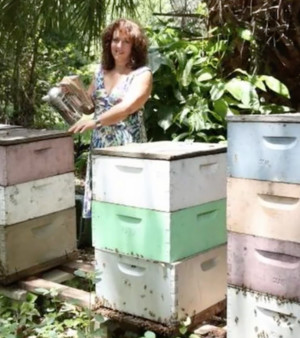09 Feb Tue 2010
Mite Be Nice....
Honeybees and mankind have had a symbiotic relationship for centuries. Of late, our friends the honeybees have been plagued by numerous perils and problems. Colony Collapse Disorder comes to mind. And Varroa mites.
These little suckers are parasites that live out their lives on our friends the bees. When the adult bee emerges it is often already affected by mites that invaded it's brood cell back when it was a mere larvae.
Varroa mites can weaken a hive in short order, and beekeepers have to keep a watchful and vigilant eye for signs of infestation.
One of the more natural approaches to mite control is the use of thyme oil. Yes, thyme, like you'd use in your holiday stuffing. The problem is....the thyme oil works great up north and in more temperate zones. But here in South Florida this oil burns the bees during hot weather.
We can use it at this time of year, when our temperatures are fairly cool. But not in the summer.
I found this rather graphic movie on YouTube depicting the Life Cycle of the Honeybee and the Varroa mite. You can find it at:http://video.google.com/videoplay?docid=-7304562435786960616#
Beware! There's a nude scene of a mite being mated by her brother. Over 18 only, please.
Because the life cycle of our honeybees and varroa mites are so critically aligned, even a few hours makes a world of difference. There's an Asian bee who emerges from its brood cell just a few hours apart from the European honeybee. And because of these few hours, it's not a perfect fit and the mites do not hugely affect the Asian bees. However, these bees are more aggressive, and not so suitable to apiculture.
We breed our bees to be gentle, for obvious reasons. And it may be that gentleness that prevents European honeybees from fighting off the mites as successfully as their more aggressive relatives. Or it may just be the time of maturation that does it.
One of my goals is to experiment with other natural controls and find a natural mite control that works in subtropical areas like Miami. People have tried everything! I've even heard some say that icing sugar will do the trick. Sweet!

